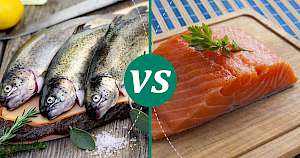Salmon vs Trout: Nutrition, Calories & Protein Compared


Salmon vs Trout
Nutrition Facts
Serving size:
change
5g10g15g20g30g40g50g60g80g100g120g140g160g180g200g220g250g300g350g400g450g500g600g700g800g900g1000g
1oz2oz3oz4oz5oz6oz7oz8oz10oz12oz15oz20oz25oz30oz35oz40oz50oz
Amount Per Serving:
Serving size:
change
5g10g15g20g30g40g50g60g80g100g120g140g160g180g200g220g250g300g350g400g450g500g600g700g800g900g1000g
1oz2oz3oz4oz5oz6oz7oz8oz10oz12oz15oz20oz25oz30oz35oz40oz50oz
Amount Per Serving:
Salmon vs Trout 100g Compare
| per 100g | Salmon | Trout |
|---|---|---|
| Calories | 197 | 141 |
| Fat | 13.11 g | 6.18 g |
| Protein | 20.32 g | 19.94 g |
| Water | 65.84 g | 73.8 g |
| Calcium | 9.423 mg | 25 mg |
| Iron | 0.259 mg | 0.31 mg |
| Magnessium | 25.39 mg | 25 mg |
| Phosphorus | 2.151 mg | 0.1 mg |
| Potassium | 378.2 mg | 377 mg |
| Sodium | 49.49 mg | 51 mg |
| Zink | 2.151 mg | 0.1 mg |
| Vitaminium A | 193 µg | 280 µg |
| Vitaminium B1 (Thiamine) | 0.207 mg | 0.12 mg |
| Vitaminium B2 (riboflavin) | 0.155 mg | 0.09 mg |
| Vitaminium B3 (Niacin) | 8.672 mg | 5.567 mg |
| Vitaminium B6 | 0.636 mg | 0.34 mg |
| Vitaminium B9 (Folic acid) | 0.026 mg | 0.011 mg |
| Vitaminium C | 3.9 mg | 2.9 mg |
| Vitaminium E | 3.55 mg | 2.34 mg |
Discover the Marvels of Salmon and Trout: A Culinary Journey
When it comes to fish, salmon and trout stand out not just for their distinctive flavors but also for their remarkable nutritional profiles. Both fish are celebrated for their health benefits and versatility in recipes. However, they have unique characteristics that cater to different palates and dietary needs. Let's dive into the fascinating world of these two popular fish, exploring their nutritional values, culinary uses, and more.
Salmon: The Vibrant Voyager of the Seas
Salmon is renowned for its rich, oily texture and a flavor that's both bold and delicate. This fish is a traveler, migrating thousands of miles across oceans, which contributes to its robust nutritional profile. With 208 calories per 100 grams, salmon is a powerhouse of omega-3 fatty acids, essential for heart health and brain function. Its vibrant pink to orange flesh, attributed to its diet of crustaceans and krill, is not only appealing to the eye but also packed with vitamins A, B, and D, as well as minerals like calcium, iron, and zinc.
Trout: The Freshwater Delicacy
Trout, on the other hand, thrives in cold, freshwater environments, offering a slightly milder taste compared to salmon. With 141 calories per 100 grams, trout presents a leaner option, yet it doesn't fall short on nutritional value. It boasts a high protein content, nearly matching that of salmon, and is rich in B-vitamins, especially vitamin B3 (niacin), which supports energy production and skin health. Trout is also a good source of minerals like potassium and phosphorus, essential for maintaining heart health and strong bones.
Nutritional Face-Off
When comparing the nutritional data, salmon has a higher fat content, including beneficial omega-3 fatty acids, making it an excellent choice for those looking to boost heart and brain health. However, trout is not far behind, offering a good amount of these healthy fats as well. Both fish have zero carbs, making them perfect for low-carb diets. In terms of vitamins and minerals, salmon tends to have a slight edge, particularly in vitamins A and D. However, trout provides more vitamin B3 and has a higher calcium content, which is beneficial for bone health.
Culinary Creations
Both salmon and trout are incredibly versatile in the kitchen. Salmon's rich flavor pairs well with bold seasonings and sauces, making it a favorite for grilling, baking, and pan-searing. Its high fat content keeps it moist and tender, even with high-heat cooking methods. Trout, with its delicate taste, is best enjoyed with subtle herbs and lemon, often pan-fried or baked to perfection. Its flesh cooks to a flaky, soft texture that fish lovers adore.
Conclusion: A Place for Both on Your Plate
In the end, choosing between salmon and trout comes down to personal preference and dietary goals. If you're after a fish that's rich in omega-3s and vitamins A and D, salmon is your go-to. For those seeking a leaner option with a mild flavor, trout offers a delightful alternative. Both fish provide a wealth of health benefits and culinary possibilities, making them worthy additions to any diet. Whichever you choose, you're sure to enjoy a delicious and nutritious meal that supports a healthy lifestyle.
Salmon 100g
197kcalCalories source
- 0% CARBS.
- 41% PROTEIN
- 59% FAT
Trout 100g
141kcalCalories source
- 0% CARBS
- 59% PROTEIN
- 41% FAT
Compares of salmon
- Salmon vs Anchovy
- Salmon vs Carp
- Salmon vs Cod Fillet
- Salmon vs Eel
- Salmon vs Flounder
- Salmon vs Halibut
- see all compares of salmon
Marcin Piotrowicz
calories-info.com creator
Healthy diet and healthy lifestyle promoter
Add comment